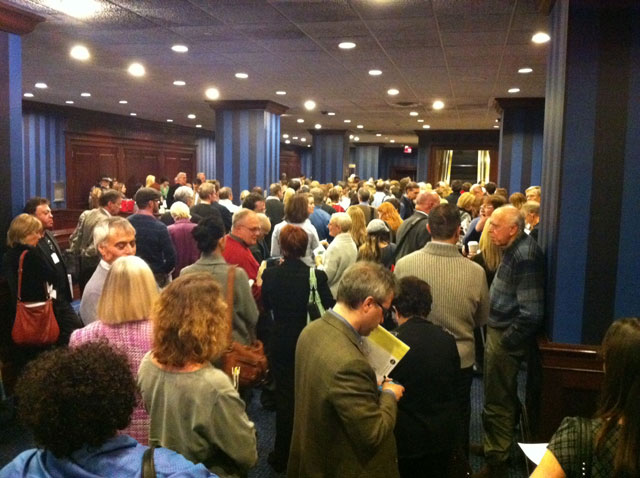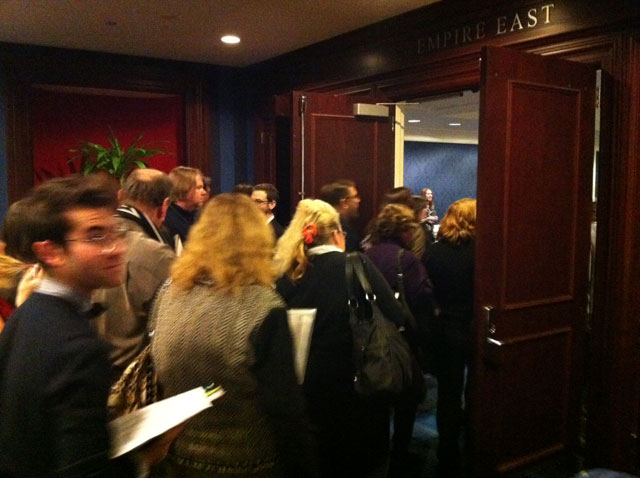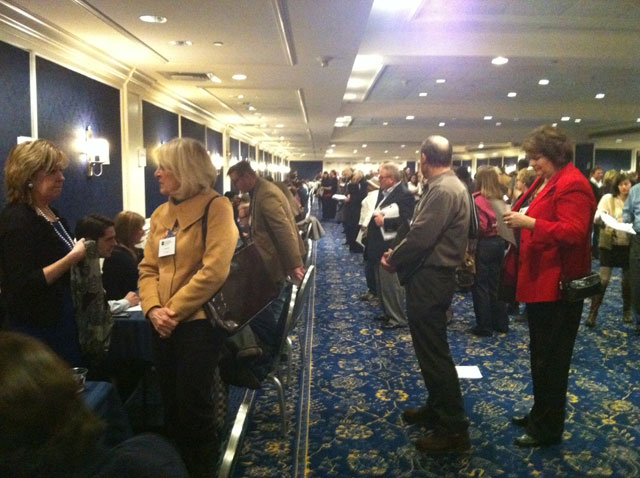I read the most incredible article this week, and I want to take the time to really explore what it means. Specifically… what it means for you and your career as a publisher or writer.
The article is a Fortune piece on Conan O’Brien, and his transition from old media personality to becoming a multimedia brand. Even if you hate Conan, read the article. It’s an important reflection on the power EACH OF US has to reshape our lives and careers.
What amazes me is that this happened last year. By then, Twitter was already seen as normal, when we all felt like we missed any “opportunity” with Twitter that would have profound effect. And yet, here we have Conan’s story, which perfectly embodies not just the power of digital media, but the power of an individual who focuses on purpose and connection.
Below are highlights from the article. But this is the main theme:
“Like millions of other Americans, Conan O’Brien’s life has been disrupted by the digital world, and he’s been forced to reinvent himself.”
If you are in publishing – if you are a writer or creator – consider how this article reflects on your career. On how we have ALL been challenged by new media, but that there is opportunity hidden within it if we care to look. I want to be clear: Conan’s story is not about technology. It is about removing the pretense, about getting back to basics – connecting with people, and doing so via a shared purpose.
If you don’t know the basic’s of Conan’s recent experience: after 17 years as a late night talk show host, NBC made an unreasonable demand: to move his show, until after midnight, and put his biggest competition (Jay Leno) in the time slot ahead of him, at 11:35. Conan would not make the move, so he left the show of his dreams. Via social media and the web, fans helped support him, and it lead the way to a very different type of career for Conan.
Okay, here is what I took away from the article:
- Conan Focused on Greater Purpose and Beliefs, not Selfish Motivation
His response to NBC’s demand that he move his show from 11:35 to 12:05:
“For 60 years the Tonight Show has aired immediately following the late local news. I sincerely believe that delaying the Tonight Show into the next day to accommodate another comedy program will seriously damage what I consider to be the greatest franchise in the history of broadcasting… I cannot participate in what I honestly believe is its destruction.”This wasn’t a discussion of contracts or formats. It was about the greater affect of his decision on the people it affected most: the fans and the work he would be building – a work that has a rich history. Messing with those things in the name of profit alone is not something he wanted to be a part of.
- Context Matters
Conan’s use of Twitter started when a fan created an image, Facebook Page and Twitter account to support him. In coming to his support, Conan saw the power of social media – something he knew nothing about. When he saw its use within the context of his situation, a light bulb went off.For those in publishing – some of this talk about digital media, social media, apps, etc must seem very foreign. Look for ways to put the proper context around it – to see how it can connect you with your core mission of sharing information and stories – of connecting with people.
- The Role of “The Audience” has Changed
On the generational shift, thanks to the web and social media: “It’s an audience that doesn’t want to be just an audience — they want to be participants. They love being connected to one another and to the celebrity objects of their affection; they love posting and creating and remixing.”In the publishing world, I hear the phrase “People still love holding books” a lot. You know what, I love holding books too. We all love books. But that’s not the question. The question is… do some people enjoy connecting with information and stories in a different manner too. Is there another opportunity IN ADDITION to holding books. One that does not belittle the book, but is simply different from it. When we stop focusing on the book, and start focusing on readers, a world of possibilities opens up.
- We Sometimes Represent Things Greater than Ourselves
“Generation X is finally at the stage where they can have the jobs the boomers had, and the economy crashes. There’s nothing left for them: There’s no Social Security; there’s nowhere to invest. Conan was a great stand-in for the frustration with this never-ending boomer legacy.”For a writer or publisher, this is about understanding that people’s relationships with your work is something deeper than purchasing and reading a magazine article or a book. That the work LIVES within them, they think about it and act on it long after the process of reading it has ended. Consider what those deeper connections are all about.
- Value Can Be Created Where There Was None Before
“What was interesting about it,” points out O’Brien, “is that all the legal prohibitions were coming from people in the old media. They were saying you can’t do all these things, and pretty quickly we realized, ‘Wait a minute!’ Someone said, ‘Does that include Twitter? No. It doesn’t include Twitter.’ And so I started tweeting.”If the publishing world tries to create the digital media (eg: ebook) world in the same image as the print world, they will find challenge after challenge. The rules that we think apply don’t really exist. But for most of us, it is scary to consider this – that these rules that secure our world-view don’t exist. For others, it leaves an opportunity. To help shape the world, and improve it.
- Power is in Aligning Purpose to Connection
“On January 23, 2010 after taping his last broadcast, Conan O’Brien, a guy who had been a staple of late-night television for 17 years, no longer had a show. Nor did he have a Facebook or Twitter account yet.” A month later, he amassed 250,000 Twitter followers in his first day on Twitter.Was Twitter the key in Conan’s success? No. It was merely a channel, be it a relevant one for his audience. It was his purpose – in combination with the channel – that had such a profound effect. When you approach a channel like Twitter, you can’t think about what it can do for you, you have to think about what you are putting into it. That is what matters.
- Learn by Doing
He sold 120,000 tickets to his live concert tour with a single Tweet, and sold out 30 shows within a few days. During the live shows, they would create a unique twitter hash tag, so Conan could keep track of what was happening in the audience, and use it in his performance. “Suddenly O’Brien wasn’t just performing for fans; he was also engaging in a conversation with them.”Conan kept exploring what could be done – how to further connect with his audience – even during a theater tour, something very traditional. Again and again, he broke down barriers that separated him from his audience.
- Freedom Matters
With his new show on TBS: “O’Brien is in control of all the on-air creative and, just as important, all the digital use of his content. He and his production company Conaco own the show. Among the other late-night talent — Leno, David Letterman, Jon Stewart, Stephen Colbert, Jimmy Kimmel, Craig Ferguson, and Jimmy Fallon — Letterman is the only host who owns his show. It’s the opposite of O’Brien’s setup at NBC, says Ross, a partner in the company. “Conaco owns the show, and TBS is a participant. At Tonight, NBC owned the show, and we were participants.” And ownership makes all the difference for O’Brien and his team.”It is hard to state how big of a shift this is for the media world. Conan will not be the last to experience a shift like this in their career.
- Rewrite the Rules of Success
“Team Coco touches more than 5 million people each month, many of them primarily consumers of O’Brien’s brand of humor online. “A lot of television executives still have the idea that a show is something everybody watches.” His team also shares clips from the show very quickly – so instead of people needing to rip them and post them, Conan’s team encourages them to simply share.Conan’s new role is something very new and very traditional at the same time. Regardless, he has rewritten the rules of success, paving the way for others.
So why am I so excited about this story? Because it’s not just about creating great content and broadcasting it, but about strengthening the CONNECTION and ENGAGEMENT between the creator and the audience. Digital media is not about marketing to people – tricking them to engage with you. Rather, it is about aligning for a common purpose.
For each of us, this is about not just embracing a thing (digital media), but embracing a change in our own identity. That even though we may have EXPECTED our careers to be one thing, we have to be open to shift and expand. Not for the sake of ‘media’ – but for the opportunity for our work to have a deeper affect on the world.
In the end for Conan, it wasn’t about him keeping “The Tonight Show” at all costs – about sitting in Johnny’s chair. It was about connecting with people – entertaining them – making their lives better.
For those of you in publishing and who are creating great work that flows through the publishing world – this comes down to the idea of whether you are focusing ONLY on the book or magazine or newspaper – or if you are focusing on the effect your work has on people’s lives, regardless of media type. And that the opportunity in front of you is to strengthen your connection to the world, and give your work the chance to have a greater purpose and effect.
-Dan





